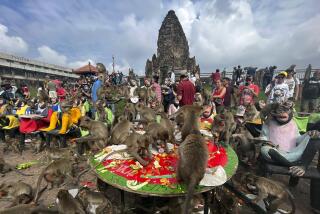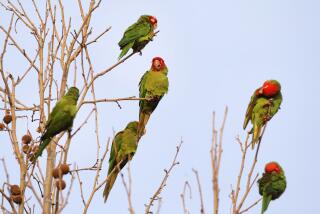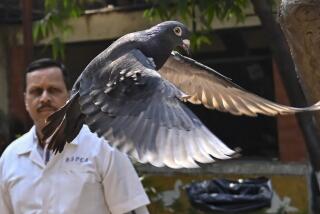Bangkok has a flight plan for pigeons
- Share via
Reporting from Bangkok, Thailand — Bangkok’s pigeons are little winged street toughs, nurtured on dust, dirt and noise.
So, the local government, out of the goodness of its heart (or maybe after a look in its pocket), has decided they need a little “holiday” in the country.
We’re sending them to the forest, officials said recently, to live a life of luxury, clean air and food aplenty.
“It’s friendlier in the forest,” said Teerachon Manomaiphibul, deputy governor of Bangkok, and pigeon relocator in chief. “It’s eco-friendly.”
For those who don’t spend sleepless nights worrying about bird welfare, the city has also tapped self-interest: Giant billboards around the Sanam Luang grounds abutting the Grand Palace, where the removal effort is focused, show images of worms found in pigeon stomachs along with details of bird flu and health risks to children.
The Bangkok government’s plan envisioned shipping the feral pigeons off to scenic Ratchaburi province amid reassurances that it wasn’t poisoning the urban pests, which it tried a decade ago. (The poisoning campaign wasn’t only a P.R. disaster, it was ineffective. “The pigeons survived and the trees all died,” one observer said.)
Not in my backyard, Ratchaburi residents cried. Why should we take your feathered undesirables? They’ll only damage our crops.
Bangkok’s Plan B involved sending the birds to another sylvan province until people there expressed similar reluctance to accept the capital’s droppings, this time on water cleanliness grounds.
“Round one went to the pigeons,” the Bangkok Post remarked in an editorial about the kerfuffle, which most recognize is motivated more by the city’s efforts to redevelop Sanam Luang than bird welfare.
Even as officials squabble over the birds’ destination, efforts to catch the feral flock continued apace.
On a recent afternoon, several police officers guarded an area the size of a football field enclosed by police tape. At its center stood a 40-foot-square frame covered with green netting with one side left open. Periodically, workers scattered food inside. Birds, long used to a beg-borrow-steal existence, flocked to the easy handout.
The government’s plan has been to lure the birds into the enclosure at Sanam Luang for a few weeks, then drop the net after they’re suitably lulled, and transport them to bird nirvana.
The police officers lounging in the shade are on duty against saboteurs -- it seems bird-seed vendors have taken to tossing firecrackers at the flock hoping that the birds won’t get lured into the trap.
Weighing in on the feathered controversy are Sanam Luang’s many fortunetellers. Sitting on a tarp awaiting customers, Chun Sae-ow, 79, used his otherworldly powers to see the future. “I predict the birds will be back,” he said.
A few feet away, on a blanket strewn with tarot cards, talismans and related spiritual objects, 76-year-old fortuneteller Sunthi found at least one good result from the anti-pigeon initiative.
“It’s scared away the bird-feed mafia, at least for now,” he said, requesting that his last name not be used to prevent their ire.
But the bird crackdown and various “Don’t Feed the Pigeons!” warnings have not scared off all the seed sellers. You have to be pretty scrappy to flog a few cents’ worth of corn for up to $15 to unsuspecting tourists.
As a tall foreigner wandered by, seed seller Tan, 57, who gave only one name, forced a bag of corn into the visitor’s hand. When he handed it back, she threw it at him. “Stingy,” the seed-selling veteran said after another foreigner refused her wares.
Even as Thai newspapers have focused recently on rumored military takeovers, conniving ex-prime ministers and political factions in colored T-shirts, they’ve kept on top of the pigeon flap.
“Educated people are bored with the endless concern over coups and red-shirt/yellow-shirt battles,” said Supoj Wancharoen, the Bangkok Post’s lead bird-coverage correspondent. “It’s a break from all that stressful stuff.”
Some aren’t waiting for the state to act. Jira Wat, 38, who sells household goods, eyed several birds in a tree just above his head, then pulled out a plastic pellet gun. “I’m a bad shot,” he said. “But if you get them in the butt, they scoot off and stop pooping on you.”
The taxpayer-funded buffet has left the flock incredibly well-fed, fortuneteller Sunthi said, with birds barely able to move at day’s end. That has prompted some people to grab plump birds and cook them up in a dish called red-pot pigeon, he said.
“I have the recipe if you want,” he said. “I’ve tried them fried, quite tasty really, although they have a lot of bones.”
Some of the details of the government plan are a bit vague, or continue morphing as opponents gather strength, but in principle the birds will be transported 3,000 at a time in racing-pigeon cages, said Neti Tuntimontri, president of the Assn. of Bird Competitors, who is helping out.
Once caught, they will get two disinfecting bird baths to rid them of mites, worms, fungi and respiratory and digestive problems. “It’s like a bubble bath for birds,” he said.
Initially, the pigeons were going to be released in the wild. But as rural residents worried about their breeding capabilities and other critics predicted they’d fly back to Bangkok, another proposal emerged: They’d be segregated in forest enclosures by sex, unable to reproduce, and fed rice husks until their natural death.
“I guarantee they’ll live longer than in the city,” said Manomaiphibul, the chief relocator, a self-avowed bird lover and pigeon racing enthusiast. “It’s like a stray dog becoming a happy pet.”
Yet another proposal would see the birds go to farmers nationwide for their eggs, which might be sold to restaurants.
Amid all the to and fro, Tuntimontri, who has raised birds for decades, scoffed at the idea that they would fly back to the capital.
“They’re too stupid,” he said. “My racing pigeons might find their way back, but these guys. . . . If they had half a brain, they wouldn’t fall for this food-net business.”
mark.magnier
@latimes.com
More to Read
Sign up for Essential California
The most important California stories and recommendations in your inbox every morning.
You may occasionally receive promotional content from the Los Angeles Times.










